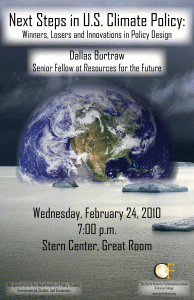Senior Fellow, Resources for the Future
Next Steps in U.S. Climate Policy: Winners, Losers and Innovations in Policy Design
 Wednesday, February 24, 2010
Wednesday, February 24, 2010
Stern Center, Great Room, 7:00 p.m.
* This event is part of the Clarke Forum’s series on Leadership in an Age of Uncertainty.
After the international climate meetings in Copenhagen, the eyes of the world rest on the U.S. and its progress towards meeting its goals for achieving reductions in greenhouse gas emissions. The leading proposal in the U.S. is a market-based cap-and-trade program, but there are a variety of approaches in designing such a program. These alternatives have very different implications for the overall cost of climate policy, and perhaps more importantly, who bears that cost.
Economists argue that cap and trade can achieve environmental goals at much less cost than traditional regulatory approaches. However, the asset value of the tradable “emissions allowances” that are introduced under cap and trade would constitute one of the largest commodity markets in the world. How these allowances are distributed – free distribution, or distribution through an auction – will have enormous implications for the efficiency and distributional impact of the policy, and ultimately on the nation’s willingness to move forward with climate policy.
Meanwhile, other regulatory approaches have already started to take shape. In the absence of comprehensive climate policy enacted by this Congress, the nation will proceed within a complicated but potentially effective policy framework that has evolved over the last forty years under the Clean Air Act. One way or another, the outcome of these policy choices will affect every household in America in profound ways.
Co-sponsored by the Departments of Environmental Studies, Policy Studies and Economics.
Topical Background
Climate change became a major political issue transcending national boundaries by the late 1980s. In December 1988, the United Nations General Assembly established the Intergovernmental Panel on Climate Change to review scientific data on the subject. The Kyoto Protocol—negotiated in 1997 and signed and ratified by 187 countries—was the outcome of an attempt to develop an international strategy to address climate change. The United States has yet to ratify the Kyoto Protocol.
Climate change is now widely recognized as the major environmental problem facing the globe. Climate change is expected to have its greatest effect on developing countries. Its effects—higher temperatures, changes in precipitation patterns, rising sea levels, and more frequent weather-related disasters—pose severe risks for the livelihood of communities and the dependability of food and water supplies. At stake are recent gains in the fight against poverty, hunger and disease, and the livelihoods of billions of people in developing countries.
Developing countries can shift to lower-carbon paths; however, this will depend on the financial and technical assistance of developed nations. The governments of high-income countries need to act quickly to reduce their carbon footprints and boost the development of alternative energy sources.
The UN Framework Convention on Climate Change (UNFCCC) 15th Conference of the Parties (COP15) meeting in Copenhagen in December 2009 was the culmination of months of negotiations complemented by community, industry and private sector-led events aimed at promoting urgent decision-making and action to combat climate change. It resulted in the Copenhagen Accord under which several developing and developed countries outlined intentions and commitments on levels of carbon emissions, pledged support for technology transfer and acknowledged the importance of forest systems in combating climate change.
In the United States, the leading proposal for climate policy is a market-based cap-and-trade program in which policymakers would set a mandatory cap on emissions of carbon dioxide and provide companies with economic incentives to reach that cap at the lowest possible cost. However, there are a variety of approaches in designing such a program. These alternatives have very different implications for the overall cost of climate policy, and perhaps more importantly who bears that cost.
About the Speaker
Dallas Burtraw’s research includes the design of environmental regulation, the costs and benefits of environmental regulation, and the regulation of the electricity industry. Burtraw holds a Ph.D. in economics and a master’s degree in public policy from the University of Michigan. He serves on California’s Economic and Allocation Advisory Committee and previously served on the Market Advisory Committee for implementation of Assembly Bill 32, the state’s greenhouse gas legislation. He also provided technical support for the development of the northeast Regional Greenhouse Gas Initiative. He serves on advisory committees for the National Academy of Science and the Environmental Protection Agency.
Video of the Program
